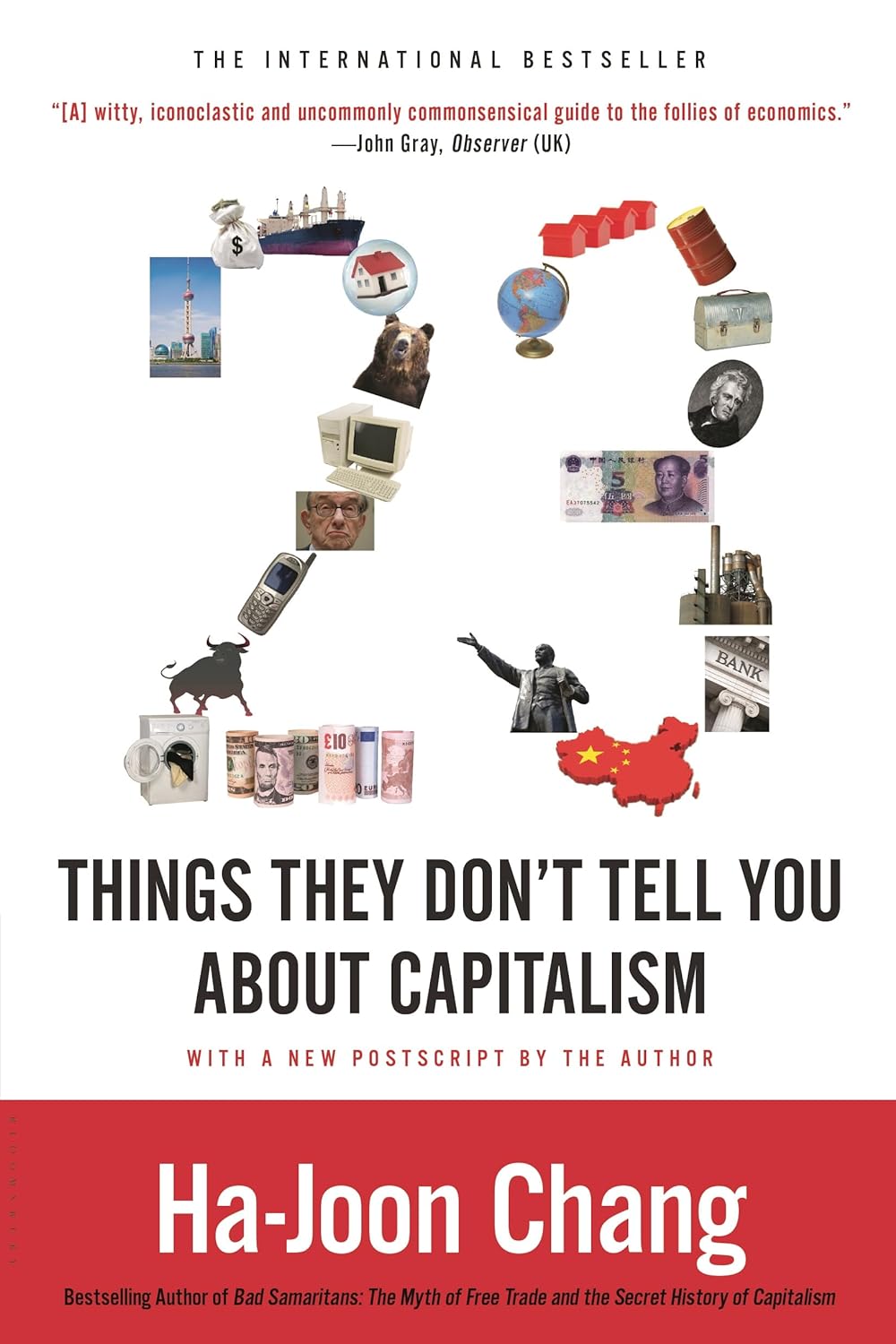Most financial experts on TV or in the newspapers tend to adhere to the same theory: free market economics. With all these individuals espousing the same viewpoint, you might be misled into believing that there is only one economic route to follow.
However, you’d be incorrect – there is plenty flawed with free market economics. Far from being a flawless, scientific approach, it encompasses numerous inaccurate notions about how the economy and society function. And there are other methodologies to consider, even if they are mostly overlooked by the media.
In this book overview, you will learn precisely what is amiss with free market capitalism and what we can all do to explore superior alternatives. After absorbing the subsequent arguments, your comprehension of economics will be forever transformed.

OVERVIEW PART 1
DESPITE WHAT FREE-MARKET ECONOMISTS ASSERT, THEIR FIELD IS NOT AN IMPARTIAL NATURAL SCIENCE.
You might recollect the massive financial crisis that swept the globe in 2008. You might also remember that in the ensuing months, economists were – excluding bankers – the most distrusted professionals worldwide. Nevertheless, this backlash towards economists was far from unjust – it was a perfectly rational reaction to their overbearing demeanor in preceding years. Quite frankly, economists had become excessively conceited.
One indicator of economists’ overconfidence was their conviction that only they were capable of fully comprehending the intricacies of economic theory. This led them to disregard any critique of their beliefs as overly simplistic.
However, this was, and remains, unequivocally untrue. Instead of being excessively intricate for outsiders, 95 percent of economics is basic common sense.
You can perceive it like this. When you dine at a restaurant, you understand the cleanliness standards you expect even though you lack a qualified epidemiologist’s credentials. And it’s no different for economics; the fundamental principles of the discipline can be grasped by anyone. After all, you don’t have to be the head of a central bank to realize that a nation shouldn’t risk all its resources on precarious investments.
This arrogance further led mainstream economic education to discredit any differing theories.
Over the past few decades, a specific economic theory has held sway: neo-classical free market theory. This ideology presupposes that every individual in society acts as a logical, self-centered agent, who only crafts an economic decision by assessing how much it will profit them. The economic profession began to view this theory almost as a natural science, leading them to concentrate excessively on a normative theory rather than its application in the real world.
But instead of being an impartial science like physics, economics is a social science. This implies there are numerous conceivable alternative theories – each just as substantiated as the free market approach.
OVERVIEW PART 2
DESPITE WHAT FREE MARKET ECONOMISTS MAINTAIN, INDIVIDUALS CANNOT FORM ENTIRELY RATIONAL ECONOMIC DECISIONS.
Back in 1997, two economists named Robert Merton and Myron Scholes were honored with the Nobel Prize in their domain. Their hypotheses predominantly rested on the notion that when making economic choices – such as where to invest their funds or which item to purchase – people made entirely rational decisions.
Post receiving such a prestigious award, the two economists put their theories into practice. Nonetheless, instead of amassing significant wealth, they found their companies bankrupt, not once but twice in little over a decade!
The failure of Merton and Scholes imparts one crucial lesson to us. You cannot anticipate human beings to always behave rationally.
Why?
To make rational decisions, individuals must consider every conceivable detail. For instance, when determining where to allocate our life savings, we need to be aware of every probable scenario, every alternate possibility, and so forth. Only when armed with all this information can we make the finest choice.
However, in today’s world, it’s impossible to assimilate every iota of information before making a decision, hence our decisions cannot be wholly rational.
Nonetheless, this doesn’t imply that we act completely irrationally. Instead, we operate under bounded rationality. We strive diligently to be rational, we just lack the mental capacity to formulate the perfect decision. But how can we adjust our economic cogitation to accommodate this?
To aid us in making the most judicious decisions, the government must intervene in the market to confine our economic options. If we are only presented choices whose ramifications we can grasp, we can commence making better decisions. The government already follows this approach in other domains. For instance, the authorities prevent us from acquiring drugs with unknown side effects or automobiles with substandard safety measures. Why shouldn’t they extend the same regulations to the financial sector?
OVERVIEW PART 3
HUMANS ARE NOT ENTIRELY SELFISH; WE OFTEN ACT BASED ON ALTRUISTIC CONCERNS.
Have you ever felt enticed to abscond without settling the fare for your cab ride? The likelihood is that, unless the driver partakes in sprinting like Usain Bolt, you could effortlessly flee. Nonetheless, despite the notion occasionally crossing your mind, you always discard it and remit your fare.
Yet, as reasonable as settling your cab fare may appear, free market economists would contend that you are acting irrationally. They argue that we are all predisposed to act selfishly and ergo we should perpetually abscond without payment.
To elucidate why we seem to defy their theory, free market economists point to the hidden advantages and penalties related to our actions. These are the costs and benefits that, though not immediately discernible, will hold sway in the long run.
Consequently, the rationale for settling our cab fares is that we don’t wish to amass a reputation as a fare evader. An individual branded with such a reputation would be utterly shunned by taxi drivers and would never secure another cab ride.
However, the theory of concealed costs and penalties flounders in a self-centered society.
Let’s revisit the cab illustration. If we absconded, the responsibility of penalizing us would devolve upon the taxi driver. He would need to give chase, demand our fare, and probably snap our photograph to exhibit to other taxi drivers in the vicinity. Throughout this endeavor, his cab would remain entirely unattended, susceptible to theft or harm.
If he were to only look out for himself, there would be no advantage for him — the fare he’d reclaim would be meager and why should he aid other taxi drivers by trackingus down?
The reality is that we compensate for our taxi journey because we prioritize values such as integrity, integrity, and reverence, rather than simply self-interest.
OVERVIEW PART 4
THE ECONOMY DOES NOT REMUNERATE INDIVIDUALS FAIRLY.
Do you concur with the assertion “we should all receive what we merit”? It seems rational, doesn’t it? Nevertheless, if you originate from a wealthy nation, you might need to reevaluate this notion. If you were remunerated based on what the market deems fitting, you may observe a rapid decline in your earnings. How could this be?
This occurs because the salaries of laborers in developed nations are shielded from market forces, keeping them elevated regardless of the job’s value.
For instance, irrespective of your professional occupation, there are individuals in other countries willing to perform it for a lower wage. You are exempt from this competition due to governmental protection of your job, maintaining your income artificially high.
Additionally, this elaborates that your earnings are dictated not by your skills, but solely by the community you reside in. Residing in a prosperous, industrious community will elevate your income due to others. Even the most indolent, least productive laborer in such a society will earn more than a diligent worker in an impoverished nation.
This disparity in wages also prevails within individual societies.
Individuals positioned at the higher echelons of society will amass earnings far surpassing what they rightly deserve compared to those at the bottom. For instance, in the early 1990s, top executives witnessed a wage surge 100 times that of an average worker. Two decades later, this margin had skyrocketed to 400 times.
Is the executive truly worth 400 times more than the annual output of the worker? The evidence suggests otherwise; the typical executive is simply not 400 times more efficient than the average laborer. Consequently, their increase is not justified in market terms.
SUMMARY PT 5: A ROBUST MANUFACTURING SECTOR IS MORE CRUCIAL FOR ECONOMIC EXPANSION THAN A VIBRANT SERVICE OR TECHNOLOGY ECONOMY.
How do you react when you pass by an abandoned, deteriorating factory? If you inhabit the developed world, you may associate it with narratives of domestic industry decline. However, such perceptions are erroneous.
People often misinterpret statistics, assuming that the reduction in manufacturing employment signifies diminished industry, whereas it indicates enhanced efficiency.
Despite this, numerous policymakers propose that emerging nations should contemplate transitioning from manufacturing to service and knowledge economies. Nevertheless, this transition could be detrimental to the overall economy.
For instance, service industries, like retail or the IT sector, have expanded over recent decades. Yet reliance on this sector might pose risks.
One obstacle with the service industry is its sluggish productivity growth rates. Enhancing productivity in a service may lead to a compromised service quality. For example, reducing a Macbeth production to a mere ten minutes may heighten productivity, but significantly diminish quality. Consequently, an economy dependent on services may encounter relatively sluggish growth.
Furthermore, there is the knowledge economy, reliant on information creation and dissemination. Since the inception of the internet, there have been claims of the knowledge economy’s vast potential.
Nonetheless, this is excessively exaggerated. Contrary to being a groundbreaking invention, the impact of the internet pales in comparison to previous communication advancements. For instance, the telegraph reduced message transmission time from two weeks to 7.5 minutes, a staggering 2,500-fold speed increase.
In contrast, the internet merely improved efficiency from ten seconds (fax machine) to two seconds, a mere fivefold reduction.
OVERVIEW PART 6
THE FINANCIAL CRISIS RESULTED FROM THE DELIBERATE ACCUMULATION OF RISK IN THE SYSTEM.
The 2008 financial crisis severely impacted the global economy, concluding over a decade of economic expansion and crippling major financial institutions.
However, numerous companies profoundly impacted by the crash, such as the insurance behemoth AIG or investment bank Lehman Brothers, played pivotal roles in their demise.
Why?
Preceding the crisis, the financial system grew increasingly intricate. Financial derivatives, like bonds, were engineered to diversify products for trading. Initially profitable, these derivatives concealed substantial risk due to their complexity.
To develop these derivatives, pools of securities, such as mortgage loans, were utilized to spawn various financial derivatives. With more derivatives fashioned from the same security, risk spiraled.
Imagine constructing a towering edifice on a meager plot. As the structure cannot expand horizontally, you opt to elevate it with additional storeys. What might unfold? With each new level, stability wanes, and instability intensifies.
Compounding this, each new financial product crafted was of inferior quality. Analogous to our slender, burgeoning house, each successive level composed of substandard material like paper or plasticine. A structure of such composition would inevitably collapse.
Albeit countries worldwide endured from the crash, those most devastated were those with deregulated markets.
For example, Ireland and Latvia, having liberalized their markets pre-crisis, endured severe repercussions; Ireland’s economy contracted by 7.5%, while Latvia’s plummeted by 16%.
OVERVIEW PART 7
DESPITE ECONOMISTS’ APPREHENSION OF GOVERNMENT ECONOMIC PLANNING, IT IS UNDERWAY AND PROVING EFFECTIVE.
Should the government intervene in economic affairs?
Liberal economists rapidly refute this notion. They contend that state intervention in the economy invariably leads to pandemonium. They showcase controlled economies like those in the Soviet Bloc as prime examples of the chaos entailed with state involvement.
Contrary to free market doctrines, governments can and do play a pivotal role in fostering economic growth.
Governments often possess superior insight into the entire economy compared to individual companies. This knowledge can be harnessed to support the most lucrative industries.
South Korea exemplifies this. The electronics giant LG originally aspired to concentrate on textiles, but governmental foresight propelled it into the electronics domain, anticipating greater success in that sector.
This principle extends beyond developing nations. The US government meticulously nurtured the early stages of the now-colossal
The internet, biotechnology, and aviation sectors.
However, what made government planning effective in these instances but not in Soviet Russia? The critical factor is avoiding excessive control.
If the state attempts to manage every aspect of the economy, like in the communist world, it will encounter difficulties. On the other hand, if it offers guidance by setting broad objectives, such as targets for inflation and regulating interest rates, then it can achieve success.
In this capacity, the state functions somewhat like a company’s chief executive officer. A CEO’s aim is to establish strategic objectives to ensure their organization progresses steadily in the right direction. Similarly, the state’s goal is to perform the same function for the entire economy.
OVERVIEW PART 8
SOCIAL WELFARE IS CRUCIAL FOR ROBUST ECONOMIC EXPANSION.
Throughout developed nations, proponents of free-market economics are advocating for reductions in social welfare benefits by governments. They assert that providing benefits like unemployment allowances or paid vacations to individuals for not working is counterproductive.
Despite theoretical arguments, empirical evidence reveals that far from being a burden, social welfare is essential for economic development.
This is evident when examining labor markets. Nations offering significant support to the unemployed tend to have more vibrant economies than those with limited assistance.
The rationale behind this phenomenon is clear. In countries with minimal aid for the jobless, individuals fear losing their jobs, prompting them to seek employment in sectors deemed more secure. They often gravitate toward stable professions like healthcare and law, which, while socially significant, do not foster high levels of economic growth.
To foster growth, it is necessary to encourage people to venture into riskier, more entrepreneurial sectors of the economy. Predictably, countries providing support for those who attempt but fail will consistently outperform those where failure results in poverty.
While evidence indicates that social welfare favors growth, the converse can be said of the free-market concept known as the trickle-down effect.
Free-market supporters propose that reduced government spending on welfare would obviate the need for high taxes. Subsequently, affluent individuals could directly invest their wealth in the economy. These investments, proponents argue, would spur growth and job creation as wealth trickles down through the economy.
Nevertheless, where this theory has been implemented, it has not yielded the desired outcomes. In countries that embraced free-market policies in the 1980s, such as the United States and United Kingdom, growth actually decelerated. As growth faltered, the trickle-down effect stagnated, and capital remained concentrated at the top.
For instance, between 1979 and 2006, the top one percent of earners in the United States more than doubled their share of national income from ten percent to 22.9 percent.
OVERVIEW PART 9
WE MUST CEASE ATTEMPTS TO RECTIFY DEVELOPING NATIONS WITH INEFFECTIVE TOOLS.
A multitude of politicians, economists, and celebrities in the West firmly believe they possess the solutions to eradicate poverty in developing countries.
Despite their confidence, a substantial portion of the developed world’s approach to impoverished nations hinges on erroneous beliefs.
One prevalent fallacy among Western policymakers is attributing poverty in developing nations to structural causes such as harsh climates, landlocked geography, or rugged terrain. However, if this were accurate, would countries like Austria and Switzerland, with their landlocked and mountainous landscapes, struggle economically?
Another misguided Western notion is that developing countries lack the enterprising drive seen in developed nations. Yet the statistics refute this claim: self-employed individuals account for 30–50% of the workforce in developing nations, while in wealthier Western countries, only ten percent are self-employed. The assertion that non-Western countries lack entrepreneurial fervor is unsubstantiated.
Western observers questioning why developing nations remain impoverished should shift their focus closer to home. Western free-market policies imposed on developing nations largely contribute to their economic plight.
For instance, in the 1960s and 1970s, Sub-Saharan African nations experienced steady growth due to protective measures instituted by their governments, which subsidized and shielded domestic industries from external competition. However, when Western governments mandated market liberalization in the 1980s, the domestic economies faltered.
To reverse this trend and propel developing nations forward, it is imperative to recall the pathway through which Western nations achieved prosperity. Historical prosperity in the West stemmed from shielding their economies from foreign competition in the nineteenth century. In the United States, foreigners were barred from acting as financial directors, and tariffs on imported goods reached 50 percent.
Wouldn’t it be more prudent to allow developing nations to follow this trajectory?
OVERVIEW PART 10
THE ISSUE LIES NOT WITH CAPITALISM ITSELF, BUT WITH ITS DESIGN.
Upon perusing this summary of the book, you may find yourself harboring frustration towards capitalism. Before considering Communist Party membership, recognize that it is not capitalism in its entirety at fault, but a specific variant – free-market capitalism.
In reality, capitalism can serve as an effective economic management mechanism.
For instance, the profit motive, or the impetus to generate profits, serves as a potent catalyst for innovation. Numerous inventions and advancements have arisen from individuals’ aspirations to develop successful enterprises.
Moreover, capitalism serves as an efficient coordinator of the economy.
The market acts as a mechanism that swiftly allocates labor and capital to areas of greatest need. Without market guidance, society might end up with an oversupply of musicians and a shortage of skilled tradespersons!
Nevertheless, despite the benefits capitalism offers, it can harbor substantial risks without adequate regulation.
Consider capitalism akin to a car. A vehicle lacking safety features like brakes or seatbelts is likely to eventually crash, resulting in harm to occupants.
Regrettably, the prevailing approach to capitalism advocates for a largely unregulated system. However, alternative strategies exist. Transitioning away from free markets could allow for the establishment of a superior, fairer, and safer capitalist structure.
One feasible approach involves integrating the concept of bounded rationality – the notion that individuals make enhanced choices with a restricted range of options.
By adopting this methodology, empowering the government within the economic system to curtail risky investment choices by bankers could promote informed and secure decision-making within society.
The Core Lesson From this Book
Disregard the assertions of professional economists that the free market is the sole method for economic regulation; there exist alternative, fairer options that we can select from. We must concentrate on these alternatives to construct a superior, more equitable, and stable world.
Actionable recommendation:
Exercise caution when selecting your political representatives.
Politicians often entice voters by promising tax reductions. While appealing initially, consider the repercussions of such cuts on public services. If you value public amenities, choosing an alternative candidate might be more beneficial.


